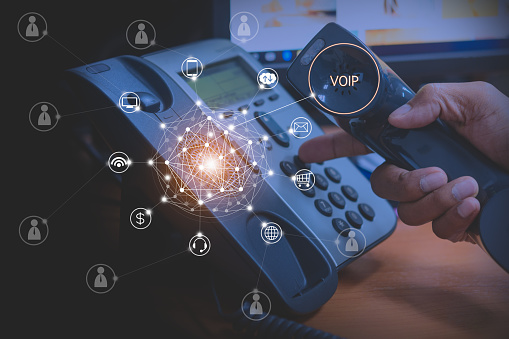Is Your Company Phone Line A Potential Security Risk?
It seems like every week, a new, high-profile data breach is in the news. Both national and international companies alike can be hacked at any time, putting clients and customers in danger of having their financial and personal information used by criminals. Likewise, breaches like these pose real threats to the stability of a company. Trust in a company’s brand, products, services, and overall reputation can be lost in a matter of days.

But while most consumers — and many companies themselves — assume that data breaches happen over the Internet (and granted, they often do), another highly susceptible mode of communication may also be the culprit of a data breach: The telephone.
While it may not appear so now, it is essential to take precautionary steps to ensure the safety and security of your company’s phone line. Here are some key questions you and your company may have on this topic:
Aren’t online security precautions enough to keep my data safe?
No, unfortunately not. Today, when consumers need to enter their personal and financial information online, companies are usually (hopefully) at the ready with security precautions in place. But most companies don’t offer the same protections on their phone lines, and hackers are becoming more and more in tune with this loophole.
Moreover, you simply cannot expect your company to go entirely online. Older consumers, especially, still want to carry out transactions and make updates to their personal information over the phone. If any customer needs to call your company, you’ll also need to verify their identity, which means asking them personal information such as their full name, address, phone number, email address,
Sometimes, customers will even be asked to give passwords, pin codes, and answers to security questions over the phone. For better or worse, there are more than a few consumers who use the same passwords, pins, and security answers for many or all of their accounts. Again, hackers are keenly aware of this and use this information to conduct illegal activity.
How can my company start protecting our phone lines better?
You’ll need to implement security protocols with your phone lines just as you do with your website.
One such form of data protection is the GDPR or the General Data Protection Regulation, an EU-based framework of rules, which aims to help consumers have more control of their personal information. You’ll need to abide by GDPR and implement the necessary payment systems into your telephone protocol. GDPR-friendly systems allow the customer to enter data — especially payment information — directly into your banking establishment’s system (often by asking the consumer to dial in their credit card or social security numbers, etc.) instead of vocalizing it to an agent.
Another thing you can do to add an additional layer of security to your phone lines is to record all calls. You’ve likely heard the phrase, “all calls will be recorded” when phoning a company or service before. This is a notification that that establishment is concerned about call security and is putting an extra precaution in place.
How can recording calls help security over the phone?
It’s a way for companies to have full transparency of what transpires on a phone call in the event of a related security breach.
Of course, one concern in this area is that call agent may take personal information from customers and use it illicitly. In the event of this occurrence (or suspicion of this occurrence), the company will have a record of all calls, which they can then use to get to the bottom of security issues.
Is my company’s phone line at risk of a data breach?
It’s best to assume that yes, it is at risk. All phone lines can be hacked and are at risk, and if your phone line ends up being compromised, your company is unfortunately in for a world of trouble. Regrettably, even if you can fix the problem right away, your current and potential customers will lose trust in your ability to protect their information.
Time and again, companies, both large and small, take hard hits because of data breaches. And earning back the reputation of old customers becomes increasingly more difficult when news of every security problem is plastered all over television, news sites, and social media.
Instead of fixing security issues after they happen, aim to prevent them altogether. Keep in mind as you move forward that this means preventing security breaches online and over the telephone.